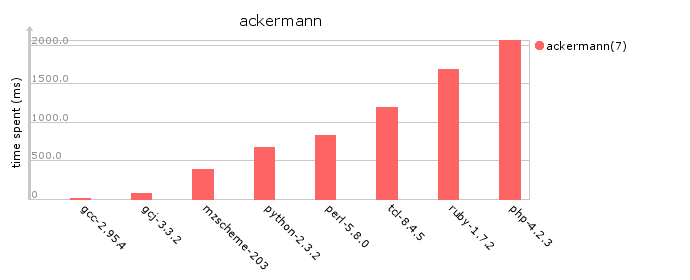Ackermann Function
From Harry J. Smith's web page about the Ackermann Function:
The Ackermann function is the simplest example of a well-defined total function which is computable but not primitive recursive. See the article "A function to end all functions" by Gunter Dötzel, Algorithm 2.4, Oct 1991, Pg 16. The function f(x) = A(x, x) grows much faster than polynomials or exponentials. The definition is:
1. If x = 0 then A(x, y) = y + 1
2. If y = 0 then A(x, y) = A(x-1, 1)
3. Otherwise, A(x, y) = A(x-1, A(x, y-1))
Test Goal
All the implementations of this test must use recursion. The idea of this test is to measure the performance of highly recursive functions (and indirectly the call stack implementation of the language), with a function with two tail recursive calls, and a non tail recursive call. Tail recursive languages will score better.Input argument meaning
The argument is used to compute: Ack(3, argument).
Results


| Language | Milliseconds | Weighted Characters |
|---|---|---|
| gcc 2.95.4 | 5 | 397 |
| gcj 3.3.2 | 69 | 341 |
| MzScheme 203 | 390 | 394 |
| Python 2.3.2 | 666 | 304 |
| Perl 5.8.0 | 828 | 271 |
| Tcl 8.4.5 | 1195 | 372 |
| Ruby 1.7.2 | 1690 | 224 |
| PHP 4.2.3 | 2067 | 252 |
Last updated: Sun Jan 18 11:15:31 CET 2004